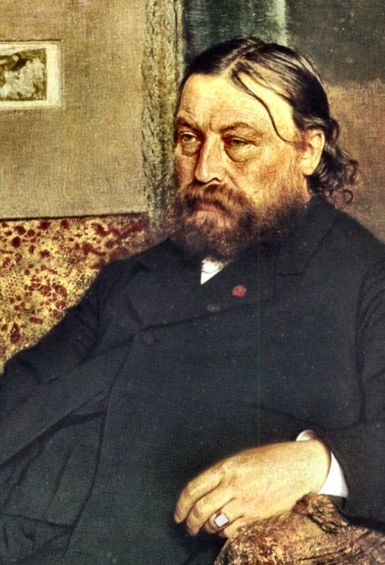<Back to Index>
- Neurologist Jules Bernard Luys, 1828
- Composer Petrus Leonardus Leopoldus "Peter" Benoit, 1834
- Emperor of Austria Charles I, 1887
PAGE SPONSOR

Petrus Leonardus Leopoldus "Peter" Benoit (August 17, 1834, Harelbeke Flanders – March 8, 1901), was a Flemish composer.
His father and a local village organist were his first teachers. In 1851 Benoit entered the Brussels Conservatoire, where he remained till 1855, studying chiefly under FJ Fétis. During this period he composed music to many melodramas, and to an opera Le Village dans les montagnes for the Park theatre, of which in 1856 he became conductor. He won the Belgian Prix de Rome with its money grant in 1857 for his cantata Le Meurtre d'Abel, and this enabled him to travel through Germany. In the course of his journey he found time to write a considerable amount of music, as well as an essay L'École de musique flamande et son avenir.
Fétis loudly praised his Messe solennelle, which Benoit produced at Brussels on his return from Germany. In 1861 he visited Paris for the production of his opera Le Roi des Aulnes ("The Erl King"), which, though accepted by the Théâtre Lyrique, was never mounted; while there he conducted at the Théâtre des Bouffes Parisiens. Again returning home, he astonished a section of the musical world by the production at Antwerp of a sacred tetralogy, consisting of his Cantate de Noël, the above mentioned Mass, a Te Deum and a Requiem, in which were embodied to a large extent his theories of Flemish music.
It was in consequence of his passion for the founding of an entirely separate Flemish school that Benoit changed his name from the French Pierre to the Dutch equivalent Peter. By prodigious efforts he succeeded in gathering round him a small band of enthusiasts, who affected to see with him possibilities in the foundation of a school whose music should differ completely from that of the French and German schools.
In its main features this school failed, for its faith was pinned to Benoit's music, which is hardly more Flemish than French or German. Benoit's more important compositions include the Flemish oratorios De Schelde (The river Scheldt) and Lucifer, the latter of which met with complete failure on its production in London in 1888; the operas Het Dorp in 't Gebergte (The village in the mountains) and Isa, the Drama Christi; an enormous mass of songs, choruses, small cantatas and motets. Benoit also wrote a great number of essays on musical matters. He died in Antwerp on the 8th of March 1901.
He also composed a Flute concerto (Symphonic Tale), Op. 43a and a piano / orchestra piece called Le Roi des aulnes ("The Erl King"), and a Piano Concerto (Symphonic Tale), Op. 43b.